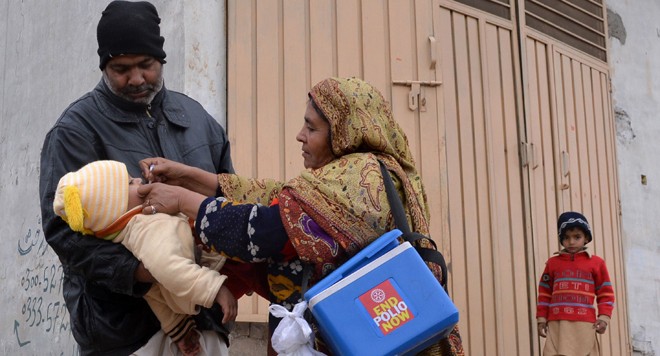

After being accused of exporting terrorism through militant groups, Pakistan has of late become the largest exporter of polio virus in the world. And the political will seems weak in taking on these challenges.
Consequently, India has put travel restrictions on Pakistan to save itself from the dangers of receiving polio virus. Earlier, in 2009, Saudi Arabia declared polio vaccination for Pakistanis mandatory, especially while performing Haj.
According to the latest genomic sequencing results of Regional Reference Laboratory for Polio Virus, about 83 out of 91 polio cases in 2013 in Pakistan are genetically linked to strains of the virus circulating in Peshawar.
The executive body of the WHO is holding its important meeting at the end of this month to discuss the polio situation. "There is a strong possibility that the 23 countries which are participating in the meeting as executive board members will make a collective decision to implement International Health Regulations to ensure that polio does not spread to other countries," says Dr Nima Saeed Abid, the acting representative of WHO in Pakistan.
He fears that if these regulations are approved for implementation, many countries will doubt the authenticity of the vaccination or certification. "They will make compulsory for people travelling from Pakistan or other polio endemic countries to have anti-polio drops at the airport to make sure that the virus is not taken to their land," he adds.
The biggest danger which is looming ahead, in his view, is that the children of Pakistan will be at risk of being paralysed because of a disease which is completely eradicable and dealt with by the rest of the world -- "The safety and security of children and polio vaccinators should be the top priority," he urges.
The recent WHO report points out that 12 out of a total of 13 cases reported in 2013 from Afghanistan were also directly linked to Peshawar. For the last four years, samples of sewage water from throughout the country are periodically tested for presence of polio virus. Eighty-six samples of sewage water were collected from different locations in Peshawar in the last four years, and 72 of these samples showed the presence of the highly contagious and paralytic wild polio virus strain.
Pakistan is the only polio-endemic country in the world where cases are on the rise. The Pakistani strain of polio has also been found in Syria, Israel and Egypt. Previously, a similar Pakistani polio strain was also found in China. The research is being conducted to trace the spread of this virus -- either through Egypt or Israel.
"Pakistan’s polio crisis is threatening to spread the virus across the world. If we do not take effective measures the efforts of the whole world to eliminate this disease will sadly go futile," says Dr Tariq Bhutta, chairman National Immunisation Technical Advisory Group (NITAG).
"Currently, we are the biggest exporters of polio in the world followed by Nigeria and Afghanistan but if they can manage to clear their names from the list, which is a possibility in the coming two years, then we will be left as the only exporter of this virus," he fears.
Bhutta, who is also a member of the two regional commissions of WHO to certify countries for becoming polio free -- EMRO (Middle East an South Asia) and SEARO ( South East Asia) -- says a strong political will is required to cope with this huge challenge -- "We need to take firm decisions to first save our own children and then save the world".
Billions of dollars have been spent in the past three decades to eradicate polio from the world. This is the only virus and disease which is eradicable through vaccine.
Bill Gates, a US based billionaire software baron turned philanthropist, in a recent statement warns that violence in Pakistan and Nigeria could delay the goal of eradicating polio by 2018. In 2013, the Bill and Melinda Gates Foundation, a charity organisation that sponsors vaccination drives, aimed to end polio in six years as its top priority.
Currently, polio remains an endemic in Pakistan, Afghanistan, and Nigeria. There are also re-infections in war-torn Somalia and Syria.